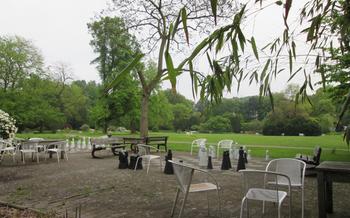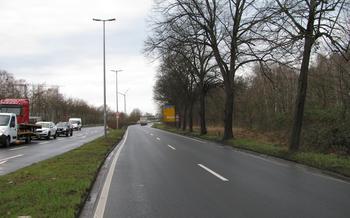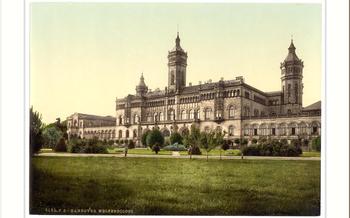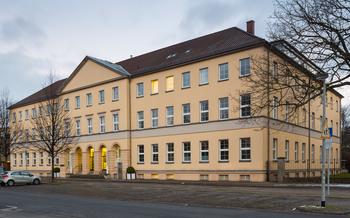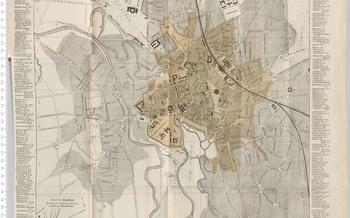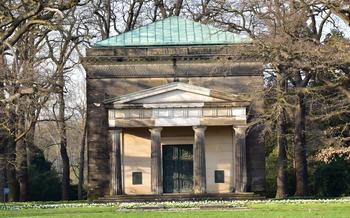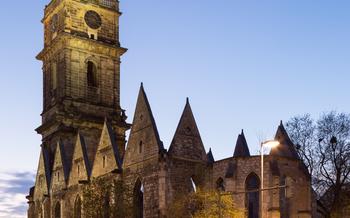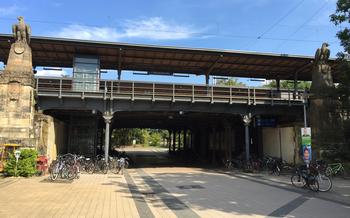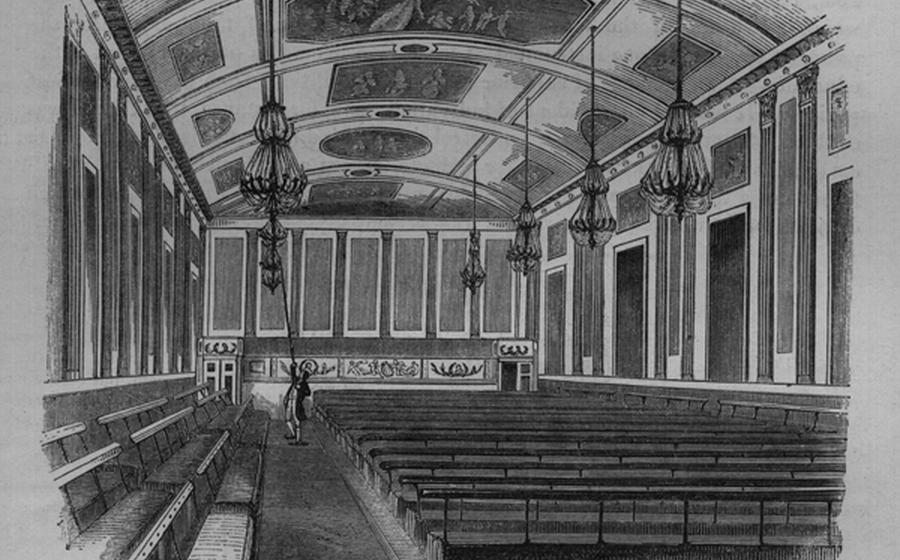
Historischer Museum am Hohen Ufer
- Historischer Museum am Hohen Ufer: A Journey Through Hanover's Past
- Tracing the City's Roots: The Early History of Hanover
- Immerse in the Splendor of the Welf Dynasty
- Witnessing Hanover's Transformation: From Duchy to Kingdom
- Unveiling the Architectural Treasures of Hanover
- Exploring the Artistic Heritage of Hanover
- Industry and Innovation: Hanover's Economic Prowess
- Hanover's Resilience During World War II
- Post-War Hanover: A City of Renewal
- Hanover's Vibrant Cultural Scene
- Discover the Charm of Herrenhausen Gardens
- Embark on a Culinary Adventure
- Explore Hanover's Green Spaces
- Venture Beyond Hanover: Day Trips and Excursions
- Insider Tip: Explore Hanover by Bike
Historischer Museum am Hohen Ufer: A Journey Through Hanover's Past
The Historischer Museum am Hohen Ufer is a captivating journey through the rich tapestry of Hanover's past. Established in 1903, this renowned museum is a treasure trove of artifacts, interactive exhibits, and guided tours that showcase the city's evolution from a humble trading settlement to a thriving metropolis.
With its impressive collection of over 300,000 objects, the Historischer Museum am Hohen Ufer offers a comprehensive insight into Hanover's historical journey. Visitors can trace the city's roots as a trading hub on the Leine River, witnessing its transformation into a fortified medieval town and a prominent regional power under the rule of the Welf dynasty.
Immerse yourself in the splendor of the Welf dynasty, whose influence shaped Hanover's political and cultural landscape for centuries. Explore their lineage, admire their lavish lifestyle through artifacts and portraits, and witness their role in Hanover's rise to prominence.
The museum's interactive exhibits and educational programs bring history to life, engaging visitors of all ages. Guided tours provide a deeper understanding of Hanover's unique heritage, while temporary exhibitions showcase specific themes and periods in the city's past.
Whether you're a history buff, a curious traveler, or simply seeking a deeper connection with Hanover's identity, the Historischer Museum am Hohen Ufer is an essential stop on your journey through this vibrant city.
Tracing the City's Roots: The Early History of Hanover
Hanover's captivating history can be traced back to the 12th century when it emerged as a modest trading settlement situated along the Leine River. During the medieval era, the city was fortified with sturdy walls and towers, reflecting its strategic importance as a regional center. The Reformation, a pivotal religious movement, swept through Hanover in the 16th century, leaving an indelible mark on its cultural and spiritual landscape. Over time, Hanover's prominence grew, and it evolved into a powerful city-state, playing a significant role in shaping the political landscape of the region.
Immerse in the Splendor of the Welf Dynasty
The Historischer Museum am Hohen Ufer not only chronicles Hanover's history but also sheds light on the significant role played by the Welf dynasty in shaping the city's destiny. The Welfs, a noble family with deep roots in German history, ruled Hanover for over 800 years, leaving an indelible mark on the city's cultural and political landscape.
Through interactive exhibits and captivating displays, the museum invites visitors to explore the lineage of the Welf dynasty and meet its illustrious rulers. From Henry the Lion, the founder of Hanover, to George V, the last king of Hanover, the museum brings their stories to life. Visitors can witness the opulence of the Welf lifestyle through stunning artifacts, including royal portraits, jewelry, and furniture.
The museum also highlights the Welfs' profound influence on Hanover's development. As patrons of the arts and sciences, they transformed the city into a center of cultural and intellectual pursuits. Their contributions to education, architecture, and urban planning are evident throughout Hanover, leaving a lasting legacy that continues to shape the city's identity.
Witnessing Hanover's Transformation: From Duchy to Kingdom
Hanover's transformation from a duchy to a kingdom was a significant chapter in its history, marked by political maneuvering, diplomatic alliances, and the impact of major historical events. Under the rule of the Welf dynasty, Hanover ascended to the status of a kingdom in 1814, thanks to the skillful leadership of George III, who also served as King of Great Britain and Ireland.
The transition to a kingdom was driven by a combination of factors. The Napoleonic Wars had significantly altered the political landscape of Europe, and Hanover's strategic location and alliances played a crucial role in its elevation. Through skillful diplomacy and alliances with Prussia and Austria, George III secured Hanover's position and gained recognition as a sovereign kingdom.
However, Hanover's sovereignty was not without challenges. During the Napoleonic Wars, the kingdom was occupied by French troops, leading to a period of instability and economic hardship. The Congress of Vienna in 1815 restored Hanover's independence, but the kingdom faced further challenges in the 19th century, including the 1848 revolutions and the Austro-Prussian War of 186
Despite these challenges, Hanover's transformation into a kingdom marked a period of growth and prosperity. The city became a center of commerce and culture, attracting artists, scholars, and merchants from across Europe. The kingdom's legacy can still be seen in the grand architecture and cultural institutions that grace Hanover today, making it a fascinating destination for history buffs and travelers alike.
Unveiling the Architectural Treasures of Hanover
Hanover boasts a remarkable architectural heritage that reflects its rich history and cultural influences. The city is renowned for its Neoclassical and Baroque styles, which can be seen in many of its iconic buildings. One of the most notable examples is the Leibnizhaus, the former home of the renowned mathematician and philosopher Gottfried Wilhelm Leibniz. This elegant mansion showcases a harmonious blend of Baroque and Rococo elements, with its intricate carvings, graceful curves, and pastel-colored façade.
Another architectural gem is the Royal Opera House, which stands as a testament to Hanover's vibrant cultural scene. Built in the late 19th century, this magnificent theater features a grand Neoclassical façade adorned with sculptures and intricate details. Its opulent interior, with its plush red velvet seats, gilded balconies, and crystal chandeliers, creates an atmosphere of grandeur and elegance.
The city's skyline is also defined by the New Town Hall, an imposing Neo-Gothic structure that dominates the city center. With its soaring spires, intricate carvings, and colorful glazed tiles, the New Town Hall is a symbol of Hanover's civic pride and architectural prowess.
The influence of renowned architects like Georg Ludwig Friedrich Laves can be seen throughout Hanover's cityscape. Laves, who was responsible for many of the city's most iconic buildings, left an enduring legacy with his Neoclassical designs. His works include the Leine Palace, the former residence of the Hanoverian kings, which now houses the state parliament, and the Georgstraße, a grand boulevard lined with stately townhouses and elegant public buildings.
Strolling through Hanover's streets, visitors can admire a diverse array of architectural styles, from medieval half-timbered houses to modern skyscrapers. The city's architecture tells a story of its past, present, and future, making it a delight for history buffs and architecture enthusiasts alike.
Exploring the Artistic Heritage of Hanover
Hanover boasts a vibrant art scene that has played a significant role in shaping the city's cultural identity. From renowned artists like Niki de Saint Phalle and Kurt Schwitters to the impressive Sprengel Museum and Maschsee Festival, Hanover offers a diverse range of artistic expressions that captivate visitors.
The Sprengel Museum, located in the heart of the city, is a must-visit for art enthusiasts. The museum houses an extensive collection of modern and contemporary art, including works by Pablo Picasso, Wassily Kandinsky, and Yves Tanguy. The museum's unique architecture, designed by renowned architect Peter Behrens, is a work of art in itself.
Another highlight of Hanover's art scene is the annual Maschsee Festival. Held on the shores of the Maschsee lake, this vibrant festival showcases a diverse range of artistic performances, including music, dance, and theater. The festival attracts visitors from all over the region who come to experience the city's artistic energy and creativity.
Niki de Saint Phalle, a French-American artist known for her colorful and whimsical sculptures, has left a lasting mark on Hanover. Her monumental sculpture "Nana" stands proudly in front of the Sprengel Museum, welcoming visitors with its vibrant colors and playful form.
Industry and Innovation: Hanover's Economic Prowess
Hanover's transformation into an industrial powerhouse is an inspiring chapter in the city's history. In the 19th century, the city became a hub of manufacturing, trade, and technology, driven by the Industrial Revolution. Local entrepreneurs and industrialists established factories and workshops that produced a wide range of goods, from machinery to textiles. The city's strategic location on trade routes and its access to the Leine River further fueled its economic growth. Hanover's industries flourished, and the city gained a reputation as a center of innovation and entrepreneurship. This period of rapid industrialization left a lasting impact on Hanover's cityscape, with many of the factories and warehouses from that era still standing today, serving as reminders of the city's industrial heritage.
Hanover's Resilience During World War II
During the Second World War, Hanover faced the devastating consequences of Allied bombings. The city endured relentless air raids that left much of its historic center in ruins. The attacks claimed the lives of thousands of innocent civilians and caused immense suffering. The resilience and determination of Hanover's citizens shone through during this challenging period.
Despite the destruction and loss, the people of Hanover banded together to support one another. They displayed unwavering courage and compassion in the face of adversity. Stories of survival and acts of heroism emerged from the wreckage, inspiring hope and solidarity. The city's spirit remained unbroken, even in the darkest of times.
After the war, Hanover embarked on a remarkable journey of rebuilding and renewal. The citizens worked tirelessly to restore their beloved city. They salvaged what they could from the ruins and began the process of reconstruction. Historic buildings were painstakingly restored, and new structures were erected, blending harmoniously with the city's pre-war character.
The preservation of historical sites and monuments was a priority for Hanover. The city recognized the importance of its architectural heritage and worked diligently to protect and restore its landmarks. This commitment ensured that future generations could appreciate the city's rich history and cultural legacy.
Post-War Hanover: A City of Renewal
The end of World War II marked a new chapter in Hanover's history, a period of reconstruction and renewal. The city lay in ruins, its once-magnificent buildings reduced to rubble. But the spirit of its citizens remained unbroken. With determination and resilience, they embarked on the task of rebuilding their beloved city.
The reconstruction efforts were immense. Buildings had to be rebuilt, infrastructure repaired, and the economy revitalized. The city's citizens worked tirelessly, clearing debris, constructing new homes and businesses, and restoring the city's cultural and educational institutions.
As Hanover rose from the ashes, it embraced modernity and innovation. New industries emerged, such as automotive manufacturing and information technology. The city became a hub of research and development, attracting talented minds from around the world.
The population of Hanover grew rapidly, fueled by an influx of people seeking opportunities in the city's expanding economy. This growth brought with it a wave of cultural diversity, enriching the city's social fabric.
Hanover also emerged as a center of education and research. The University of Hanover, founded in 1831, expanded its offerings and gained international recognition for its research in various fields. The city also became home to numerous research institutes and laboratories, contributing to its reputation as a hub of innovation.
The post-war era marked a time of transformation for Hanover. It evolved from a city devastated by war into a modern and vibrant metropolis, embracing progress while preserving its rich history and cultural heritage.
Hanover's Vibrant Cultural Scene
Hanover bursts with cultural vitality, offering a plethora of experiences to enrich your stay. Immerse yourself in the city's vibrant theater scene, where renowned venues like the Schauspielhaus Hannover and the Theater am Aegi stage captivating productions ranging from contemporary dramas to classic masterpieces.
Indulge in the harmonious melodies of classical music at the Hanover State Opera, renowned for its world-class performances and stunning acoustics. Art enthusiasts will delight in exploring the city's numerous museums, including the Sprengel Museum, which houses a remarkable collection of modern and contemporary art, and the Kestner Museum, showcasing applied arts and design from various eras.
Throughout the year, Hanover hosts a multitude of festivals and events that celebrate its rich cultural heritage. The Maschsee Festival, held annually on the shores of the Maschsee lake, transforms the city into a vibrant hub of music, art, and culinary delights. The Schützenfest Hannover, one of the world's largest marksmen's festivals, offers a lively blend of traditional parades, music, and amusement rides.
Hanover's culinary scene is equally diverse and enticing. From traditional German fare to international cuisine, the city's restaurants cater to every palate. Indulge in hearty dishes like "Niedersächsisches Himmelreich" (Lower Saxony Heaven), a regional specialty made with potatoes, apples, and blood sausage, or savor the flavors of international cuisines at the many ethnic restaurants scattered throughout the city.
Whether you're a theater aficionado, an art enthusiast, a music lover, or a foodie, Hanover promises an unforgettable cultural experience that will leave you craving more.
Discover the Charm of Herrenhausen Gardens
Herrenhausen Gardens: Located just a short distance from the city center, the Herrenhausen Gardens are a must-visit for any visitor to Hanover. Encompassing three distinct gardens—the Great Garden, the Berggarten, and the Georgengarten—Herrenhausen is a testament to the city's rich history and love of nature.
Historical Significance: The gardens were commissioned by the Welf dynasty in the 17th century and served as a symbol of their power and wealth. Over the years, they have undergone numerous transformations, reflecting the changing tastes and styles of each era.
Exploring the Gardens: The Great Garden is the largest and most elaborate of the three, featuring a grand central water feature, beautiful flowerbeds, and meticulously sculpted hedges. The Berggarten, on the other hand, is a botanical garden that houses a diverse collection of plants from around the world. The Georgengarten, the most recent addition, is known for its idyllic landscapes, tranquil ponds, and stunning rose gardens.
Architectural Treasures: In addition to the natural beauty of the gardens, visitors can also admire the impressive architecture that adorns the grounds. The Great Garden is home to the Herrenhausen Palace, a magnificent Baroque masterpiece that serves as a reminder of the Welf dynasty's grandeur. The Berggarten features the Leibnizhaus, a former summer residence that now houses a museum dedicated to the renowned philosopher and scientist Gottfried Wilhelm Leibniz.
Strolling and Relaxing: The Herrenhausen Gardens are the perfect place to escape the hustle and bustle of the city and immerse yourself in nature. Visitors can stroll along the tree-lined paths, admire the colorful flower displays, or simply relax by the tranquil ponds.
Cultural Events: Throughout the year, the gardens host a variety of cultural events, including concerts, art exhibitions, and garden festivals. These events provide a unique opportunity to experience the gardens in a different light and connect with the local community.
Embark on a Culinary Adventure
Hanover offers a delectable culinary adventure that tantalizes the taste buds and showcases the region's rich culinary heritage. Indulge in traditional German dishes such as hearty schnitzel, flavorful bratwurst, and crispy potato pancakes. Savor the local specialty, Calenberger Pfannkuchen, a unique dish made with potatoes, bacon, and onions.
Explore the city's vibrant café culture and find a cozy spot to enjoy a cup of freshly brewed coffee and a slice of delicious cake or pastry. The Markthalle, a bustling indoor market, offers a delightful array of local produce, artisanal cheeses, freshly baked bread, and specialty items. Join a culinary workshop or cooking class to learn the secrets of German cuisine and create your own culinary masterpieces.
Hanover's culinary scene is diverse and caters to various preferences. From traditional German taverns to international restaurants, there's something for every palate. Don't miss the opportunity to indulge in the city's culinary delights and discover the flavors that make Hanover a foodie's paradise.
Explore Hanover's Green Spaces
Hanover is home to several serene and breathtaking green spaces that offer respite from the hustle and bustle of city life. Take a leisurely stroll through the Eilenriede, a vast urban forest that covers over 600 hectares. With its ancient oak trees, tranquil ponds, and winding paths, the Eilenriede is a haven for nature lovers and outdoor enthusiasts. Relax by the picturesque Maschsee, a beautiful lake in the city center. Surrounded by lush greenery and dotted with colorful sailboats, the Maschsee invites visitors to enjoy picnics, boat rides, or simply bask in the sun.
Stroll along the banks of the Leine River and admire the stunning views of the city skyline. The Leine River, which flows through the heart of Hanover, offers a tranquil escape from the urban landscape. Visitors can take a leisurely walk or bike ride along the riverbanks, enjoying the fresh air and the serene surroundings. Discover the Hanover Zoo, home to a diverse range of animals from all over the world. With over 2,000 animals representing more than 180 species, the Hanover Zoo is a popular attraction for families and animal lovers. Explore the zoo's spacious enclosures and learn about the fascinating creatures that call it home.
Venture Beyond Hanover: Day Trips and Excursions
Hanover serves as an excellent base for exploring the surrounding region of Lower Saxony and beyond, offering a wealth of day trip opportunities. The nearby Harz Mountains, with their picturesque landscapes and charming towns, are a popular destination for nature enthusiasts and outdoor adventurers. Discover the historic city of Celle, with its well-preserved half-timbered houses, or embark on a journey to medieval Hamelin, where the Pied Piper legend comes to life. Explore the beautiful countryside, dotted with quaint villages and rolling hills, and immerse yourself in the region's rich history and culture. Whether you prefer hiking, biking, or simply soaking in the tranquil atmosphere, the surroundings of Hanover offer a diverse range of experiences that are sure to leave a lasting impression.
Insider Tip: Explore Hanover by Bike
Hanover is a cyclist's paradise, with an extensive network of bike lanes and paths that make it easy to explore the city on two wheels. Rent a bike from one of the many rental shops in the city center and set off on an adventure. Discover hidden gems and lesser-known attractions, such as the idyllic Georgengarten, the tranquil Maschsee lake, or the picturesque Leine River. With its flat terrain and well-connected bike paths, Hanover is the perfect city to explore by bike. Combine sightseeing with a healthy and eco-friendly activity, and enjoy a unique perspective on this vibrant city.

